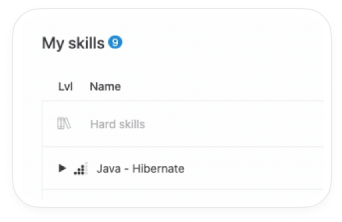Talent Management Trends and Insights on How to Use Them
Table of contents
- What is talent management?
- Global trends that have the biggest impact on talent management
- 5 talent management trends
- Talent management trend #1: Emergence of the virtual HR department
- Talent management trend #2: The rise of data-driven HR
- Talent management trend #3: Shift in focus towards younger employees
- Talent management trend #4: Importance of on-the-job training and development
- Talent management trend #5: Culture checks
- Summing up
Recent trends in talent management have been shaped partly by the pandemic and how HR leaders have responded to new work models.
We’ve already shared predictions about HR trends and HR tech solutions. But what about talent management?
In this post, we overview the five most important new trends that have already started impacting talent management. These talent management trends can help you beat the competition in an increasingly scarce talent pool, retain the talent you already have, and ensure your employees are engaged and understand their career paths within your organization.
What is talent management?
Talent management is the way your company hires and retains employees. A talent management policy will help you find high-performing employees and a place for them in your company to meet current and future needs.
The ability to attract high-performing employees also affects your business. And with an increasingly mobile workforce, a concerted effort is needed to address these challenges. Tracking talent management trends helps your company’s HR department adapt to new challenges and improve key performance indicators (KPIs) for talent management, such as employee satisfaction, engagement, and turnover.
Global trends that have the biggest impact on talent management
According to the European Strategy and Policy Analytics System (ESPAS) report, the next decade will be decisive for the future of the world order, including talent management. Transformation of economic models and the very structure of society, new uses, and misuses of technology, contrasting demographic models, and humanity’s growing ecological footprint — the world is on the way to a new geopolitical, geoeconomic, and technological order.
What effect will global changes have on HR departments and talent management trends? Let’s analyze::
- Blended experience between physical and virtual worlds. Automation and conversational AI will handle the initial triage, freeing human support for those who need it. Seamlessly blending physical and virtual environments will be vital to improving the overall employee experience and sustainability.
- The data fixation of me, the internet of us. We live in a data-rich world, and the quantity of data continues to grow rapidly. Human-centered services are becoming more critical in strengthening people’s trust. Services can adapt to employees’ preferences and provide early intervention for those who need it most.
- AI + collective human intelligence. Using AI to assist collective human intelligence increases the ability of HR managers to decide, adapt, and learn. With this approach, our combined potential is limitless.
- Tendency to gain temporary skills. Nowadays, employers are looking for fundamental skills and responsibilities in potential employees rather than formal qualifications and training. Many courses were offered online during the pandemic, and the demand for flexible learning continues to grow.
- Virtual companies and new professional fields. After Meta introduced its Horizon Workrooms VR meeting room in September 2020, the company announced a new work platform called Infinite Office. This platform allows employees to collaborate on whiteboards or laptops just like in a computer game. Business locations can be digitally modeled and made accessible through virtual reality goggles.
- Young people are shaping a new investment culture. You can call the new generation of workers young investors. They are using their smartphones to quickly assemble portfolios and discuss stocks, initial public offerings, and investment performance on social media, creating demand for new services for their work.
Now, let’s move from general to specific by considering talent management trends that are popular today.
5 talent management trends
Effective and reliable talent management isn’t only good for employees; it helps your business grow. Effective talent management requires a thoughtful and systematic approach, and adopting such an approach typically leads businesses to outperform their competitors. Here are some top trends that recruiting, HR, managers, and executives should consider this year.
Talent management trend #1: Emergence of the virtual HR department
Virtual HR is a talent management trend that has recently gained popularity. This practice allows a company to manage its employees’ files, benefits, and payroll with no on-site HR department. Virtual HR allows employees to manage their own records, benefits, and payroll information, making it easy to update and manage changes.
There are multiple advantages of virtual HR. First, this talent management trend can save the company money on renting office space and other related costs. It also increases efficiency by having remote employees handle HR tasks. Finally, with virtual HR, companies can save time and avoid the need to send employees to training seminars.
This talent management trend can help companies be more flexible. With the ability to hire from around the world, a company can find the best talent regardless of where they live. Virtual HR can also help a company better respond to market changes. By hiring new employees quickly and easily, companies can adapt to changes in customer demand.
The main reasons for using virtual HR include cost savings, the ability to hire employees from around the world, and the ability to avoid the cost of hiring a full-time HR manager.
Talent management trend #2: The rise of data-driven HR
Large enterprises use this talent management trend to forecast global trends, but increasingly, data analysis is used by small and midsized enterprises and HR departments.
Globally, data analytics is being used beyond pulse surveys to cover employee interaction points throughout the employee journey in recruiting and talent management.
When everything in HR is digital, prioritized, and data-driven, HR can show what strategic business objectives are directly affected by their work — and how. For example, by developing more effective recruitment, retention, and compensation systems, HR can directly increase sales revenue and improve the company’s talent management strategy.
- Analytics enables HR and its functions to improve workforce productivity.
- Analytics enables HR to help increase corporate agility and adaptability.
- The job market data allows the HR department and its functions to effectively develop talent management.
- Predictive analytics prepares managers and HR for the future.
Data-driven HR is suitable for talent management and moves the HR department to data-driven decision-making. Because moving to this new model will allow HR to interact more effectively and share data with all other business functions, HR will understand their own needs better and provide improved service to all other business functions.
Get ideas about data-driven recruiting
See how the concept of data-driven recruiting can work. Then, learn why a data-driven hiring process is vital for your company.
Talent management trend #3: Shift in focus towards younger employees
According to the US Bureau of Labor Statistics, more than half of the US professional workforce is under 45. With Generation Z entering the workforce and boomers retiring at 10,000 per day, the workforce is undergoing a fundamental change in talent management strategy.
This year companies will pay more attention to young employees. That’s because millennials will make up most of the workforce by the end of the year, and companies will want to attract better specialists and retain this group. To do this, they should offer more flexible working arrangements that millennials prefer. Another strategy is to develop junior employees’ skills and career paths.
Talent management trend #4: Importance of on-the-job training and development
Companies are increasingly focusing on providing employees with on-the-job training and upskilling. This is because traditional education is no longer considered sufficient to prepare people for modern work. As a result, companies and businesses are investing more in employee training programs, ranging from online courses to on-the-job mentoring. By doing this, companies can ensure they get the most out of their employees.
Talent management trend #5: Culture checks
Training and development opportunities, diversity, and corporate sustainability improve work culture and talent management strategies.
A 2022 LinkedIn survey found that companies with better training have a 53% lower attrition rate, reducing hiring costs and increasing productivity. Employees need to learn new skills, and companies should stay abreast of the latest technology, so training and retraining are vital.
Likewise, diversity, equity, and inclusion (DEI) is a strategic and financial advantage for businesses, and it is quickly becoming a priority for people when choosing a workplace. Glassdoor has a DEI employee satisfaction rating. And nearly three-quarters of companies that have world-class talent management programs focus on gender and global diversity, according to a study by HR consulting firm Deloitte.
Summing up
Talent management is a topic on the minds of all organizations as the workforce becomes increasingly globalized, technological, and competitive. As these changes unfold over the next decade, monitoring what’s happening around you will be critical. This article has revealed the top five predictions for trends in talent management for 2022 and beyond, and there are sure to be more. Incorporate some of these trends into your hiring practices, and contact us for more talent management strategies.
Stay up to date with our newsletter
Every month, we’ll send you a curated newsletter with our updates and the latest industry news.




























 info@hrforecast.de
info@hrforecast.de
 +49 89 215384810
+49 89 215384810






